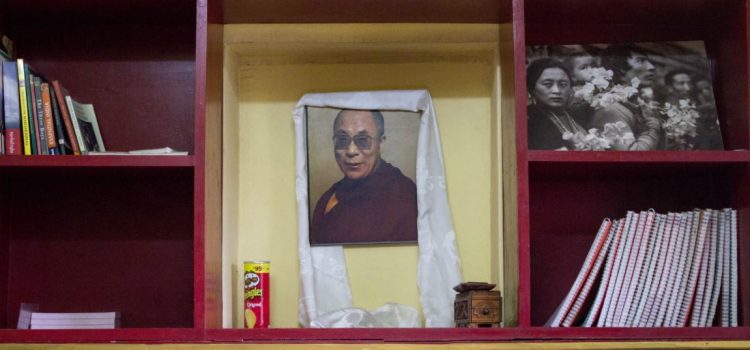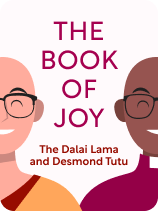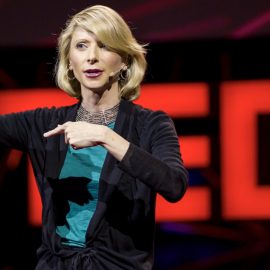

This article is an excerpt from the Shortform book guide to "The Book of Joy" by The Dalai Lama, Desmond Tutu, and Douglas Abrams. Shortform has the world's best summaries and analyses of books you should be reading.
Like this article? Sign up for a free trial here.
What does the Dalai Lama say about joy? What’s the difference between joy and happiness?
In The Book of Joy, Desmond Tutu and the Dalai Lama define joy and why everyone should pursue it. They also point out the distinct difference between joy and happiness so you will no longer confuse the two.
Keep reading for the Dalai Lama on joy and its importance in life.
Defining Joy
We’ll start by defining joy before discussing why the practice of joy is a worthy pursuit for ourselves and for others. According to neuroscience research, joy is one of only four basic human emotions. The other three are fear, anger, and sadness—all emotions that can cause suffering—making joy the only emotion that explores what is good and satisfying about the human experience. Joy can cover a broad range of positive experiences, including pleasure, amusement, contentment, excitement, relief, wonder, bliss, pride, and gratitude.
| How Many Basic Emotions Are There? The four-emotion model is based on neurocircuitry research revealing that fear, anger, sadness, and joy are all associated with distinct patterns of physiological and neural activity. For example, anger is associated with increased arousal and activation in regions of the brain involved in threat detection and aggression, while sadness is associated with decreased arousal and activation in these same regions. However, there’s ongoing debate in the field of emotion research about the exact number of basic emotions, with some researchers arguing in favor of alternative models with more or fewer basic emotions. For example, studies of human facial expressions suggest that there are at least seven basic emotions: anger, contempt, disgust, fear, happiness, sadness, and surprise. |
While many of us may conflate joy and happiness, Tutu and the Dalai Lama make a clear distinction between the two. They explain that joy, unlike happiness, is not dependent on external circumstances. Instead, joy depends on the attitude we adopt in those circumstances. Joy is a state of being, or way of looking at the world, unaffected by the ups and downs of life.
(Shortform note: The definition of joy as a state of being closely aligns with the Greek concept of eudaimonia as outlined by Aristotle in Nicomachean Ethics. Aristotle argues that eudaimonia, a long-term sense of contentment and well-being, is the “ultimate good” and the purpose of human life. He contrasts this with the idea of hedonia, or the blind pursuit of pleasure, however fleeting.)
According to what is said by Tutu and the Dalai Lama on joy, the purpose of life is to alleviate our own suffering through the discovery and practice of joy. While they agree that suffering is inevitable, they offer joy as a path through suffering. Throughout their conversation, Tutu and the Dalai Lama discuss how joy not only offers an antidote to personal suffering, but creates a virtuous cycle of well-being in which your pursuit of joy not only benefits you, but also your friends, family, and community. Their joy will inevitably increase your joy, and so the cycle continues.
| What’s the Purpose of Life? Philosophers have long debated the purpose and meaning of life. Some philosophers, like Aristotle or Epicurus, came to similar conclusions as Tutu and the Dalai Lama, suggesting that the purpose of life is to find freedom from suffering through the pursuit of joy. Others, like Immanuel Kant, may have agreed that lasting happiness can’t depend on external circumstances; but Kant came to a different conclusion, suggesting that the purpose of life is the ongoing pursuit of the highest moral good. Finally, philosophers like Friedrich Nietzsche and Jean-Paul Sartre adopted a more existentialist view, arguing that there’s no inherent meaning in life. Nietzsche believed that individuals must create their own meaning in life through self-discovery, while Sartre emphasized the importance of personal authenticity and the rejection of external, imposed values. |

———End of Preview———
Like what you just read? Read the rest of the world's best book summary and analysis of The Dalai Lama, Desmond Tutu, and Douglas Abrams's "The Book of Joy" at Shortform.
Here's what you'll find in our full The Book of Joy summary:
- Archbishop Desmond Tutu and His Holiness the Dalai Lama's guide to joy
- What joy actually is and why it matters so much
- How to find joy exactly where you are, no matter what your life looks like






